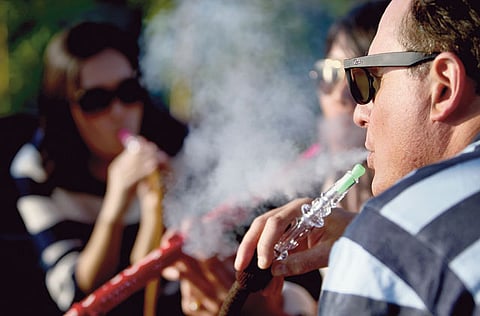Seven Saudi cafés shut down for serving shisha
Officials warn of tough action against anyone challenging country's smoking ban

Manama: Municipality officials in the Saudi city of Jeddah on the Red Sea have shut down seven cafés for serving shisha, the single or multi-stemmed instrument for smoking flavoured tobacco, despite an official ban.
“The municipality inspectors have closed down the coffee shops after they failed to comply with the law that bans offering shishas to clients in closed areas,” Hassan Abdul Wahab Ghunaim, a municipality official, said. “Some of the cafés did not have the licence required to serve shisha. They will have to pay fines for breaking the law,” he told local news site Sabq.
Shisha equipment was seized in the raids.
Jeddah, like all other cities in Saudi Arabia, has warned restaurants and cafés in residential areas that they would face stringent action if they failed to comply with the law banning serving shishas.
The former interior minister of Saudi Arabia, which is one of the world’s leading cigarette markets, in summer reiterated the significance of applying a ban on smoking in public places.
Royal decree
Smoking at all ministries, government institutions and public places was banned under a royal decree and that the application of the ban was a necessity, the minister said.
The ban on cigarettes and shishas is extended to all closed places, including coffee shops, restaurants, shopping malls and crowded areas, he said.
There is a full ban on the sale of cigarettes to people under the age of 18, the directives said.
Shisha smoking culture is deeply embedded across the Middle East.
According to official figures, Saudi Arabia is home to six million smokers, including around 800,000 teenagers, mainly intermediate and high school students, and 600,000 women.
Cigarette consumption
However, expatriates also account for a significant proportion of cigarette consumption in Saudi Arabia despite the increase in campaigns about health concerns, the adoption of several legislative restrictions and new views on the effects of passive smoking.
A Saudi topflight football team in August imposed heavy financial penalties on a group of players caught smoking shisha in a coffee shop in Abu Dhabi, where the squad was taking part in a friendly tournament.
A Saudi judge in summer ruled that women who suffered as a result of their husbands’ smoking were allowed to file divorce cases against them.
Last month, Saudi judges set a new trend in the country by using cigarette smoking as a factor in child custody cases.
“A parent could now lose the custody case if he or she is proven to be a smoker,” a legal official said.
“Under the emerging trend, the smoking factor is now being treated like the drinking factor and can decide the outcome of the custody case,” the expert who was not named told local Arabic daily Al Eqtisadiya.
The court would favour non-smoking parents and would factor smoking into custody cases to protect the child from the negative impact of passive smoking, he said.
Sign up for the Daily Briefing
Get the latest news and updates straight to your inbox



